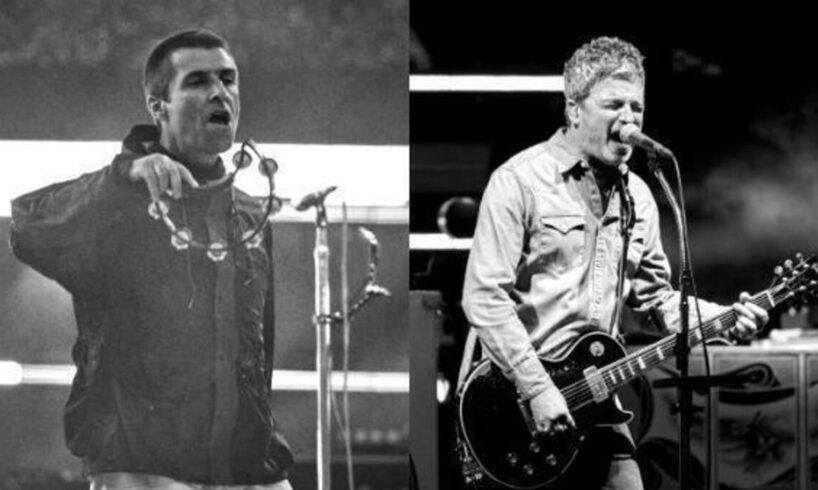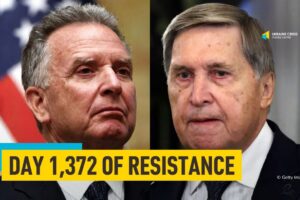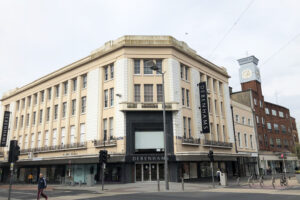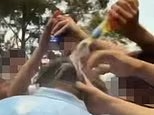
When Oasis fans were recently criticised by Edinburgh Council in relation to the upcoming three concerts at Murrayfield Stadium in August, Liam Gallagher famously leapt to the defence of those planning on going along to the gigs.
Cultural commentator John Robb is in total agreement with the frontman’s sentiments. “I think it’s snobbery,” says Robb, also a musician and journalist who recently published a new book Live Forever: The Rise, Fall and Resurrection of Oasis.
“If they can’t cope with the Oasis concerts because of the Fringe, as they suggested, maybe they should have let it go to Glasgow. With them having Irish blood and coming from Manchester, they’ve always connected with rebel cities like Glasgow.”
The Gallagher brothers’ parentage is well-known, and Robb stresses that the band’s connections to Ireland aren’t just something to be wheeled out when they play in this country.
Noel Gallagher and John Robb.
“The Irish part was super important,” says Robb. “There’s a quote from John Savage in the book where he talks about Oasis being slightly on the outside. Being Irish you are a natural rebel operating outside the British culture, a lot the attitude comes from there, and the art. It’s so mixed in with the Irish blood, it’s been good for us English to have that Celtic mix.”
Tim Abbot is another associate of Oasis who is well aware of their Irish links. The label manager at the band’s label Creation Records during their rise, one of his fondest memories of his time with the group was travelling over to Ireland for two shows in Dublin back in March 1996. “My mum and Peggy [Gallagher, mother of Liam and Noel] got on well, my mum was a teacher. We all went to Dublin for the Point gigs with all the mums and dads.”
Abbot is currently touring his film, The Lost Tapes: Oasis Like Never Before, and has just released an updated version of his Oasis: Definitely book, including unseen pictures of the band that he began to shoot and film in 1993.
“I shot twenty hours of footage, and I’d say 20% of the Supersonic film is my material,” he recalls. “It’s all hand-held stuff that includes Noel playing an early version of Don’t Look Back In Anger and there’s footage of them working on Champagne Supernova. It’s the early story of the band surpassing everyone and their life on the road. I’m the man in the middle of it all with a video camera.”
Tim Abbot with Liam Gallagher and Oasis producer Owen Coyle.
Abbot also recalls his first time hearing of Oasis, via a late-night phonecall from Creation Records boss Alan McGee. “He actually called me the night he signed Oasis when he was in Glasgow at King Tut’s Wah Wah Hut [venue]. Alan had the band’s demo and he said: ‘I’ve just signed this amazing band, you have to have a listen’. I was like ‘Dude, it’s 2am’.”
What was it like to be in the eye of the storm during the band’s rise? “It wasn’t chaos,” suggests Abbot. “If it was, then we managed to control it, we kind of harnessed it… we were all holding on for grim life. In truth, we were a functioning team.”
Things did get out of control for Abbot when the band mistakenly consumed crystal meth, mistaking it for cocaine before an infamous show at the Whiskey-A-Go-Go in Los Angeles, leading to Noel quitting the band for two weeks.
“I did have to go and find Noel and bring him back into the flock,” says Abbot reflectively. It was while taking some time out in San Francisco that Noel wrote one of the band’s most loved B-sides, Talk Tonight.
“It’s almost like two different bands,” adds John Robb, “Noel was doing demos a few years before, and that’s almost like his style, these more introspective acoustic songs which appeared on the B-sides along with the more raucous tabloid band, it was like two different groups.
“It shows how different they are, vocals by Noel tend to be more melancholic and introspective, while Liam’s are the opposite, not always, but often. They are almost split personalities in terms of how they do the vocals.”
When Oasis regrouped after the Whiskey-A-Go-Go debacle, the next big gig in their itinerary was the Glasgow Barrowlands in December 1994, a performance attended by this writer. The gig was seen as a major turning point for the band.
“You had to prove it at the Barrowlands; it was one of those gigs,” explains Robb, “Oasis were seen as an overnight success but they had two years of being ignored. Most bands have to take baby steps doing three support tours, but with Oasis, after that it was really quick.”
The Glasgow show didn’t run smoothly with Liam Gallagher walking off stage with some throat problems. It was left to Noel Gallagher to perform an acoustic set, playing many of those plaintive Oasis B-sides while promising to return with Liam two weeks later, the promise was fulfilled but there was something special about the first night despite Liam’s absence.
Both Robb and Abbot agree that The Rain, basically Oasis minus Noel that first formed in 1991, deserve more credit. “Some of that attitude was put down in the early Boardwalk rehearsal days,” says Abbot. “Tony McCarroll was a great drummer and some people coat him off but he was important because the Oasis DNA was Definitely Maybe pre-Alan White coming in on drums.”
A new generation have discovered early unreleased Oasis tracks such as Take Me. Such was the strength of Noel’s songwriting, the band disregarded anything he hadn’t written when it came to recording. “Noel had wanted to record Take Me but the band said ‘no’, they only wanted to do his songs,” confirms Robb.
Paul ‘Bonehead’ Arthurs, the man who helped create the Oasis wall of sound on rhythm guitar, is said to be one of the writers of the song. He will join Noel and Liam in Dublin as the only other original member of the band.
Ahead of the much-anticipated tour, Noel was asked about the potential for a fall-out. “We’re too old to give a shit now, so there won’t be any fallouts, there won’t be any fighting. It’s a lap of honour for the band,” he said. So far so good.
As John Robb suggests, Oasis have captured yet another cultural moment, defining the summer of 2025 as much as they did in the mid-1990s. “Heaton Park was the most visceral, thrilling Oasis show I’ve seen,” says Robb of the recent Manchester leg of the tour.
“The band has never sounded better, tighter, and more urgent as they breathed life into decades-old songs that are all cemented deep into the psyche of a generation. They could have just collected the money and run, but they also had something to prove, and it has driven the gigs to a new level.”
Live Forever: The Rise, Fall and Resurrection of Oasis, by John Robb, is available now
Tim Abbot is currently touring The Lost Tapes: Oasis Like Never Before. For more info on dates and a new version of his book Oasis Definitely, visit oasisdefinitely.com





